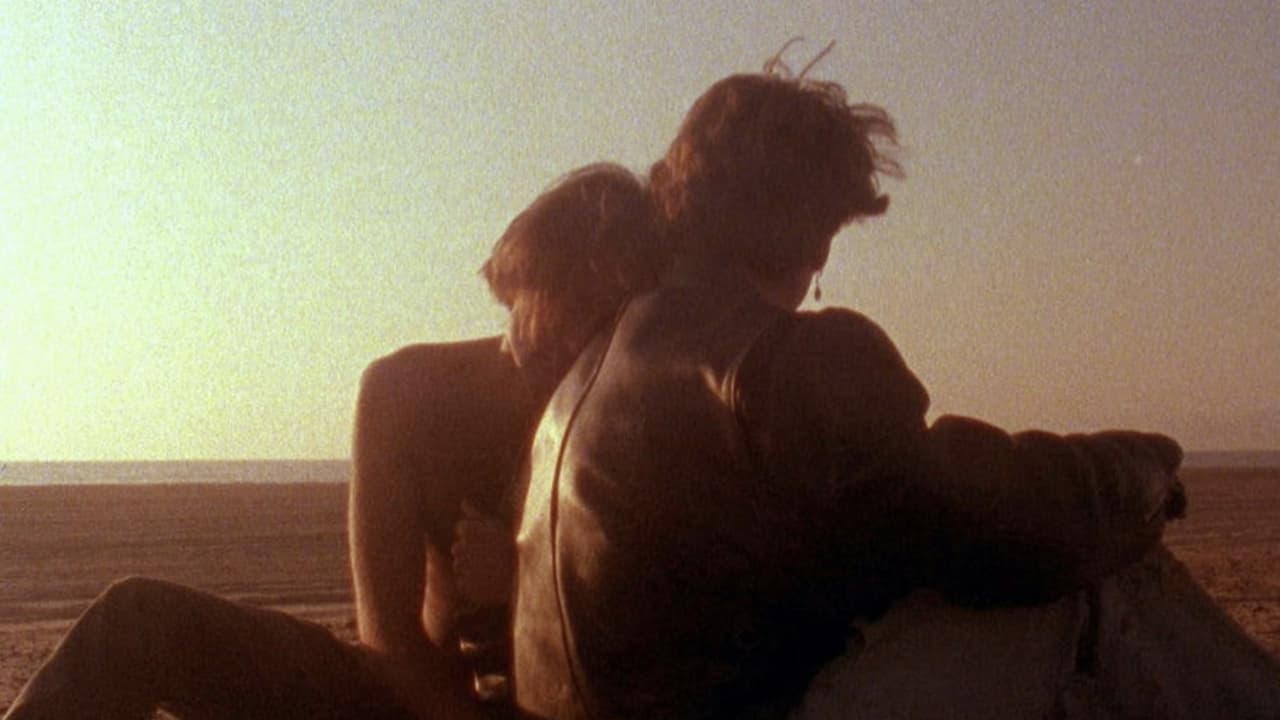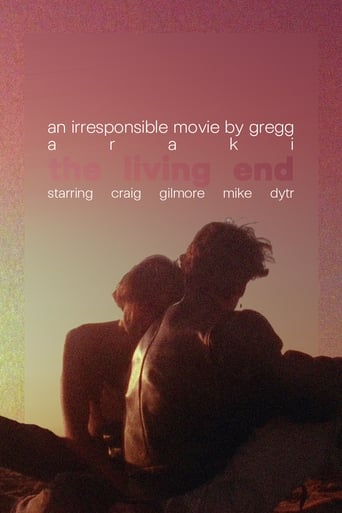



I like the storyline of this show,it attract me so much
View MoreIntense, gripping, stylish and poignant
It isn't all that great, actually. Really cheesy and very predicable of how certain scenes are gonna turn play out. However, I guess that's the charm of it all, because I would consider this one of my guilty pleasures.
View MoreThere are moments that feel comical, some horrific, and some downright inspiring but the tonal shifts hardly matter as the end results come to a film that's perfect for this time.
View MoreGregg Araki is a brilliant director that finds in subversive and polemic subjects a complexity and richness that would pass unnoticed for other filmmakers."The Living End" is a story that deals with death. However, unlike most movies Araki has found a balance between Freudian Eros and Thanatos. The life drive and the death drive are equally as important for Jon and Luke, the protagonists. They alternately assume different roles regarding impeding death. For Jon, at first, is denial when he confronts the fact that he has AIDS. He trusts in his doctor's words when is told that this diagnosis does not equal a death sentence. Not just yet anyway. Luke, on the other hand, has a clear self-destructive tendency; he seems to be wandering off amidst repellent streets and dangerous highways, with no goals and no real desire.They meet. They have sex. But here sex is devoid of the Freudian libido. Sex at first may be a consequence of the life drive but ultimately it's but an act of despair, it's the result of an undeniable lack of hope. And what is hope in the end? Is it an abstract concept or rather the force that prevent us from languishing in a situation in which our success is never guaranteed? I'd venture to say that hope comes down to one element: creation. And it's clear for the viewers that Jon and Luke will never be able to create a life together, their existence has already been forfeit."Afterlife is just this pathetic notion people cling to in order to avoid confronting their own mortality" explains Jon to Luke. And according to Slavoj Zizek he is absolutely right. In "The Seven Veils of Fantasy" Zizek explains that fantasy gives structure to reality. Fantasy is what allows people to confide in the symbolic order, fantasy is also more powerful than people might expect. Fantasy is the imaginary support upon which we build everything: we don't see human bodies we only see bodies through a certain fantasy; in fact, certain neurosis consist in seeing the body as it is (a disgusting cumulus of fluids, excrement, viscera and blood), and as a result there is a complete rejection of the other, or the constantly paranoid fear that contact with others will bring forth contamination or filthiness. Fantasy also structures desire ("what am I in the eyes of the other?"). Is Luke this rude, gay-macho version of Clint Eastwood or is this irresponsible, childish guy that makes Jon laugh with his nonsense? Is Jon this well-behaved gay, a productive member of society, or is he an absolute desperate person (willing to embark upon a nearly suicidal road trip with his newly found lover) that seeks out an indefinable truth that will give meaning to his remaining days? Fantasy also allows people to understand abstract concepts. What is a nation, for example? Benedict Anderson defines nations as "imagined communities", id est, arbitrary creations upon which people agree on.Nevertheless, the most important conception of fantasy here is that which veils and hides the real. Fantasy secludes oneself from the awful truth. Fantasy nurtures mythological and theological narratives that deal with something that has frightened people since the dawn of time: death. Sometimes, fantasies that veil the horror of death are as clumsy as the nice and tidy instructions and warnings one receives in every flight concerning the possibility of an "accident" (one has but to wonder what use a fastened security belt has when most airplane crushes end up turning people into a pulp, scattered tissue, that prevents even dental records to be obtained from the wreckage), but also as influencing and historically relevant as the heaven versus hell narrative that church still proclaims to this day.What is "The Living End"? It is a glance of what happens once we withdraw from fantasy. Araki's film shows us what happens when death is no longer an abstract concern but a certainty. It demonstrates that a once life-driven Jon can lose all hope thanks to a medical diagnosis and thus embrace a death drive; it demonstrates that for all his bravado, Luke might not be the overtly self-destructive, death-seeking guy we saw in the first scenes. Life drive turns into death drive and vice versa (the extraordinary last scene condenses a powerful eroticism in contrast with an incontestable death wish). But one thing is clear: The veil has been removed and death no longer hides from mortal eyes. It's there, looking Jon and Luke right in the face. And they are looking back with a very fearless and subversive expression.
View MoreMy first impression going in to see "Brokeback Mountain" when that one came out, was; "How boringly common gay love seem to be". And i thought of it being boringly common in a cinematic sense. Only rule broken in that movie was to make it possible for a large audience to have empathy with it characters without hiding the gayness of them. It worked. I salute that. And i still think that was the performance that earned Ledger his Oscar.But Arakki does not stay within content when making his movies great (when they are). His style is widely overlooked by his "controversial" content. Even though the two are matched as should be in good art craft.Let me just give you one example to look for. One scene, in the beginning of the movie, we see the character of Luke, who's been hustling another man, back at that mans place. Suddenly the john's wife or girlfriend appears and the acting style changes to that of badly made porn. But not only the style of acting, also the cutting. The woman and Luke never appear in the same frame and the shots of him reacting to her, could have been taken weeks apart (a common use in porn to make models appear in the same scene, although they were never on set). The woman is acting so badly, that it can only be a parody of the clichés of porn too, since, Arraki surely knows how to get good actors and know how to direct them.Lots of other good stuff could be commented on, but let me just get back to my pronouncing it the best gay LOVE story told on screen; Even thought the character of Luke can be seen as only a projection of Jon's diagnosis as HIV positive (His way of coping with it as Scottie has to invent Madelaine in "Vertigo" facing death).... it still is a love story, sick as it may seem. And a hell of a lot closer to fulfilling what we look for in love stories, than the ones with either happy or weepy ends. This one has both and rings truer.
View MoreGregg Araki is certainly one of the strangest directors ever to emerge in the genre of independent filmmaking, and "The Living End" is no exception to his unique style, which is reminiscent of Jean-Luc Goddard while maintaining an individuality that makes it clearly a film by Araki. I've heard the film described as a "gay 'Thelma & Louise,'" but I think this to be inaccurate. This film I think is far more powerful than "Thelma & Louise." Two HIV positive gay men, one the sensible-living perfectly normal Jon, the other the free-wheeling hustler Luke, who from the very first shot in the film we can tell has totally given up as he graffitis "F**k the World" on the wall. More typical Araki catches phrases run rampant throughout the film as these two men go on a road trip around the west coast trying to find something worth their time. What makes the film so powerful is the presentation of its message, rather than the message itself. The difference between sex and real love is subtlely explored as the relationship between Jon and Luke grows more and more complicated, as Luke's hairtrigger attitude often gets them in trouble and Jon steadily wanting to give up love to continue his life for as long as he can and as responsibly as he can, though it never seems to work. Sometimes it's not so subtle, but for the most part the notion of love between these two people is so skillfully handled that the air of sadness that hangs over them just resonates, in spite of the large number of humorous moments. The ending is so brutally sad, though totally unexpected. I won't give it away but you'll have to see it for yourself, it is a wonderful movie. It certainly is not for all tastes. However, if you can appreciate good cinema, then I think this film will not disappoint you. You might not like it, but it is a very powerful film.
View MoreI wanted to appreciate this "male version of Thelma and Louise," and I thoroughly enjoyed the young leading actors. I think their chemistry worked very well, and I was glad the story didn't degenerate into a crime spree. I was pleased that they didn't just throw everything aside for the sake of rage and violence, too, despite their disillusionment caused by their HIV+ conditions.BUT I must have gotten the WORST film transfer copy ever made! Was my copy the only one like this? It looked like the film caught in the projector gate during the film transfer, and the projectionist was out having a smoke someplace and didn't ever notice! This happened for at least half the film. I can't believe ANY company would distribute such a LOUSY film transfer. This completely ruined the film for me!
View More